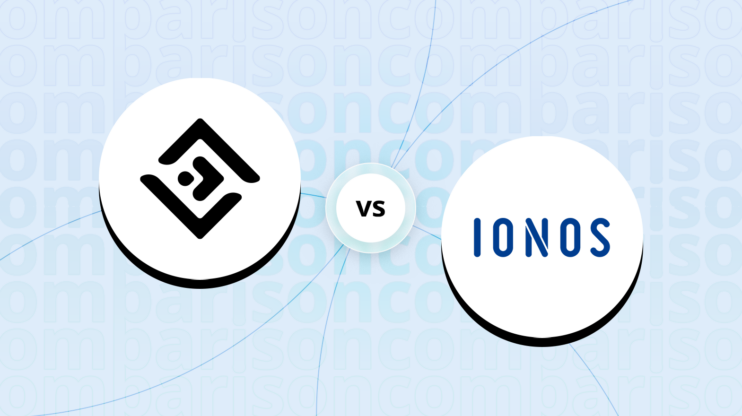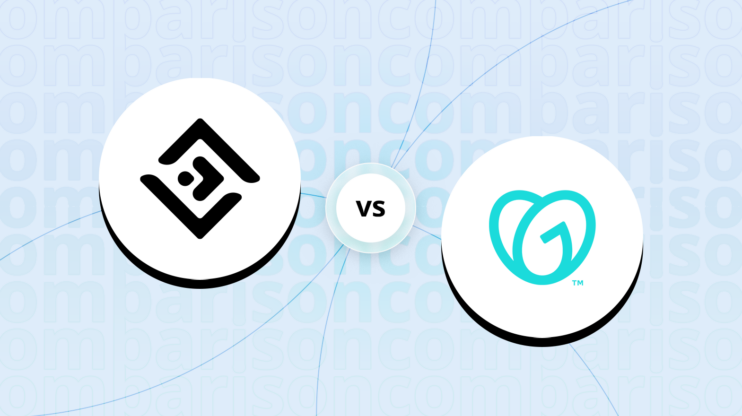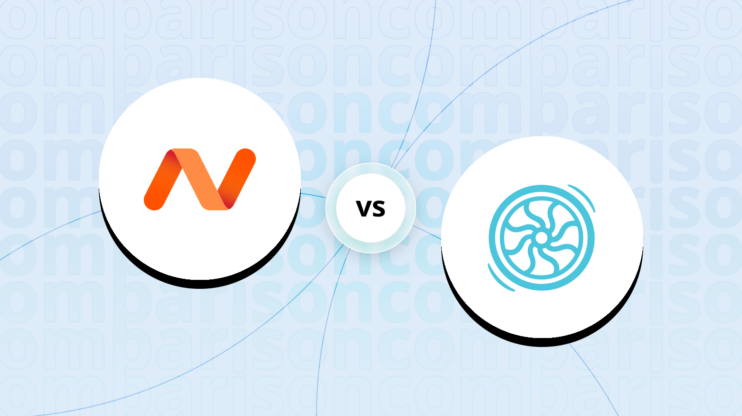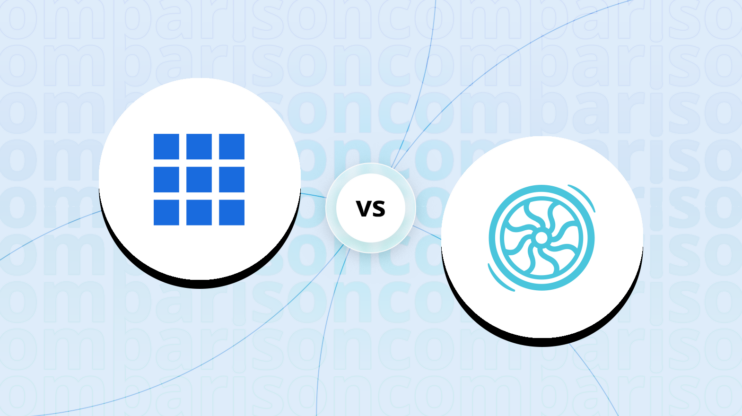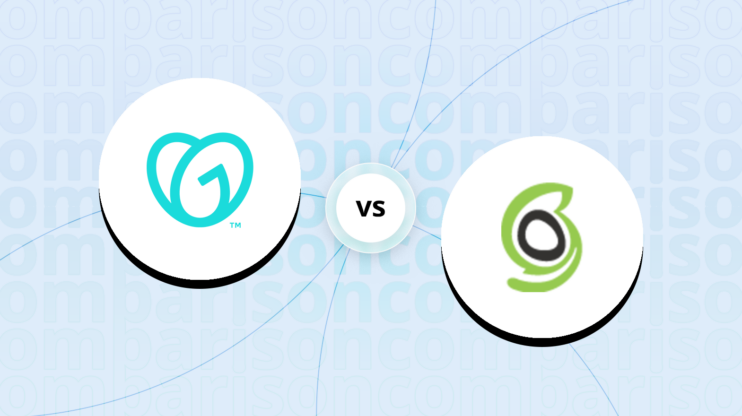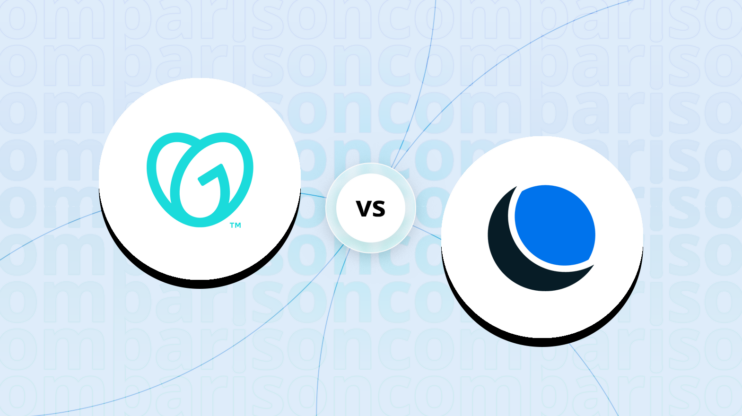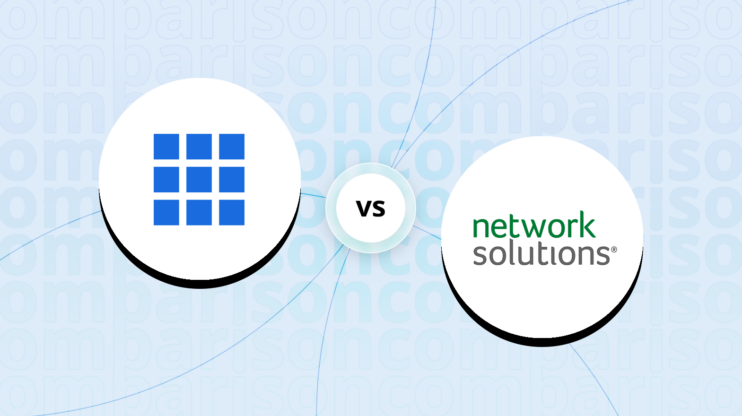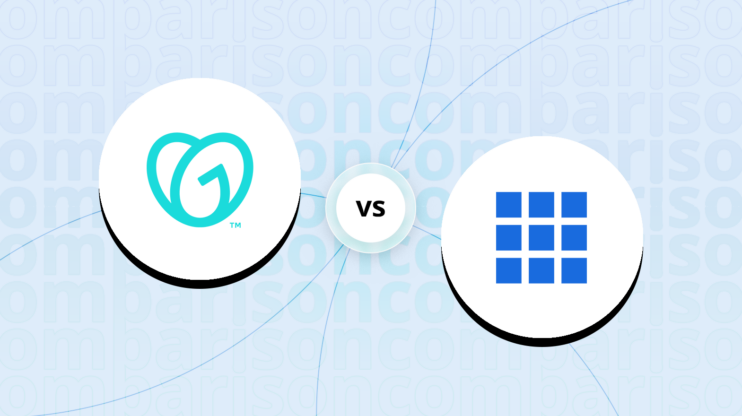Final verdict
Looking over GoDaddy vs. IONOS, both providers offer solid hosting solutions, but IONOS edges out with a more comprehensive feature set and better value.
-
GoDaddy (Overall grade: 7.8)
provides a versatile range of hosting plans, excelling in user-friendliness and speed, thanks to its global data centers and optimized servers. Its hosting includes a broad spectrum of services—from shared to managed WordPress hosting—along with useful addons like free email hosting and SSL certificates. However, the frequent service upsells, higher renewal rates, and occasional short downtimes, particularly with its WordPress hosting, slightly undermine its reliability. Despite these drawbacks, GoDaddy stands out for its seamless setup process, robust performance, and solid support infrastructure, making it a suitable choice for various user needs, especially for businesses looking for integrated digital services.
IONOS (Overall grade: 8.2)
offers a comprehensive hosting solution with a strong focus on performance, security, and scalability. With a guaranteed 99.9% uptime, georedundant infrastructure, and advanced DDoS protection, IONOS ensures high availability and minimal disruptions. Its speed optimization tools include dual-platform technology, HTTP/2, and Cloudflare CDN, which ensure brisk page loads and reliable performance. Notably, IONOS provides elastic scaling and a more detailed user management system, making it ideal for growing businesses and agencies. The inclusion of personal consultants for tailored support further enriches the user experience. Though IONOS’s initial setup might be less familiar to users accustomed to cPanel, its comprehensive features and competitive pricing ultimately offer a greater value.
 Overall grade:7.8 |
 Overall grade:8.2 |
|
|---|---|---|
| Uptime and Availability | 8.6 | 9.0 |
| Hosting Performance | 8.1 | 8.2 |
| Hosting Security | 8.6 | 8.9 |
| Price | 7.7 | 8.5 |
| Hosting Features | 7.1 | 5.8 |
| Ease Of Setup | 8.7 | 8.5 |
| User Management | 5.0 | 7.9 |
| Customer Support | 8.2 | 8.7 |
| User feedback | 3.9/5 | 3.5/5 |
Hosting types offered
Both platforms provide a variety of hosting types, each designed to meet the different needs of users.
 |
 |
|
|---|---|---|
| Shared hosting | ||
| Cloud hosting | ||
| WordPress hosting | ||
| Ecommerce hosting | ||
| VPS hosting | ||
| Dedicated hosting |
Although both offer a variety of hosting plans tailored to different needs, in
certain cases, one platform may prove to be more suitable.
Detailed comparison
Uptime and availability
Evaluates the average uptime statistics, uptime guarantee and overall availability of the hosting
provider
Score Components:
- Uptime percentage (30%): evaluates the uptime statistics in given period of time
- Uptime guarantee (20%): Assesses if the platform offers an uptime guarantee and
whether the actual uptime matches the promised guarantee. - General performance (25%): Evaluates how fast is the average response time and overall
it’s stability. - Responsiveness (10%): Adaptability to different devices and screen sizes.
- Availability (25%): Reflects the total downtime and number of outages.
 8.6
8.6
 9.0
9.0
Winner IONOS: A comprehensive solution offering high availability and extensive features.
In evaluating the uptime and availability of hosting providers, IONOS stands out due to its advanced infrastructure and consistent performance. It guarantees a 99.9% uptime with mirrored data across two centers for enhanced reliability during maintenance or outages. The inclusion of DDoS protection, Cloudflare CDN, daily backups, and a mobile admin app enhances the overall hosting experience. These features collectively ensure minimal disruptions and optimal performance, presenting a reliable option for personal and business use.
GoDaddy, with its 99.9% uptime guarantee and impressive 99.98% uptime rate during test periods, also offers strong performance. Quick server response and competitive load times further add to its credibility. However, frequent short downtimes in WordPress hosting and limited compensation options slightly dampen its reliability. Despite these issues, GoDaddy remains a solid choice for users prioritizing speed and ease of use over advanced infrastructure features.
In comparing the two, IONOS emerges as the superior hosting provider with its geo-redundant infrastructure and additional user-friendly features. GoDaddy provides effective hosting solutions, but IONOS’s comprehensive approach and extensive tools offer a marginally better value proposition.
Hosting performance
Score Components:
- Hosting speed (30%): This includes SSD quality, Load times, PageSpeed score ranges,
additional information on website speed, built-in plugins for performance enhancement, available caching
methods, and CPU/RAM options - CDN (20%): Considers whether CDN is available or not, whether it’s free or paid, and
the quality of the CDN service - Available data centers (30%): Evaluates the number of data centers and their locations
globally. - Scalibility (20%): Looks at whether elastic scaling is available, the process required
to scale (manual upgrade vs. automatic scaling), the presence of dedicated servers, and the costs
associated with scaling.
 8.1
8.1
 8.2
8.2
🏆 Winner
IONOS: Offers slightly superior performance with excellent security and scalability.
Both GoDaddy and IONOS provide solid hosting performance, but IONOS edges out with a few additional benefits. In terms of speed, both providers offer SSD storage and fast server response times, with GoDaddy boasting up to 40% faster server response. GoDaddy uses a global data center network covering North America, Europe, and Asia-Pacific, while IONOS relies on dual-platform technology and the HTTP/2 protocol for improved speed. IONOS also includes a Content Delivery Network (CDN) from Cloudflare distributed over 60 data centers globally, offering an extra layer of speed optimization.
Website Speed
When diving into website speed, GoDaddy offers optimized servers that promise up to 40% faster response times, coupled with an impressive 99.9% uptime guarantee. IONOS utilizes dual-platform technology, HTTP/2 protocol, and SSD storage to deliver speedy performance. The use of PHP 8.2 with a JIT compiler in IONOS promises faster page loads and better overall performance metrics. GoDaddy’s global data centers ensure localized fast load times, making the provider reliable for various markets.
Scalability
GoDaddy offers a variety of plans that require users to upgrade manually for more resources. Users have options from shared hosting to VPS and dedicated resources. IONOS, on the other hand, offers more elastic scaling features where performance levels can be adjusted as needed. This allows users to enhance their website’s performance without a full plan upgrade, with each additional performance level costing $2/month. This flexibility, along with email notifications for resource limits, gives IONOS an edge in scalability.
Hosting security
and regulatory requirements
Score Components:
- Technical security measures (40%): This includes encryption, firewalls, DDoS
protection, secure configurations, server monitoring, access control and availability of security addons
(e.g Sitelock security). - Operational security measures (30%): Encompasses data privacy, backups and data
redundancy. - Compliance and certifications (20%): Adherence to legal and regulatory requirements
(e.g., GDPR, HIPAA) and possession of certifications (e.g., ISO 27001, SOC 2). - Business and reliability (10%): Factors in the provider’s reputation, uptime
guarantees, and customer support.
 8.6
8.6
 8.9
8.9
🏆 Winner
IONOS: Superior security features and sophisticated compliance measures.
Both GoDaddy and IONOS, have notable differences in their approaches to technical and operational
security, as well as in their compliance with regulations.
Technical security measures:
GoDaddy offers a comprehensive suite of SSL certificates, including AutoSSL, Managed SSL, and Self-Managed SSL options. They support the latest PHP versions like 7.4 and 8.0. IONOS provides various SSL certificates with up to 256-bit encryption, and they support PHP versions from 4.0 to 8.3, including PHP with JIT compiler and OPcache. Both platforms offer malware protection and DDoS protection, but IONOS includes advanced DDoS shielding and georedundant data centers. IONOS stands out with automatic malware removal in certain plans and customizable firewall rules.
Operational security measures:
GoDaddy ensures daily backups, automated updates, and 24/7 customer support through phone and chat. On the other hand, IONOS also guarantees automatic daily backups and offers a dedicated personal consultant for personalized support. IONOS includes anti-phishing and anti-spam filters, as well as SSH and SFTP access for secure website management. IONOS employs advanced intrusion detection and prevention systems monitored by SIEM software. Both providers have extensive customer support options, but IONOS provides more customized solutions.
Compliance and certifications:
GoDaddy is fully compliant with GDPR and offers PCI-certified products for secure transactions. IONOS also complies with GDPR and incorporates ISO-certified data centers for strict data protection standards. PCI compliance is more implied than stated for IONOS. Both providers prioritize GDPR compliance, ensuring personal data is handled securely and transparently.
 |
 |
|
|---|---|---|
SSL certificate |
AutoSSL, Managed, Self-Managed (DV, OV, EV) |
DV, OV, EV with up to 256-bit encryption |
Additional security features |
Malware scanning, WAF, DDoS protection, CloudLinux, Cage FS |
DDoS protection, georedundant data centers, customizable firewalls, SIEM |
PHP versions |
7.4, 8.0 |
4.0 to 8.3, JIT, OPcache |
GDPR compliance |
Full compliance |
Full compliance |
HIPAA compliance |
Not specified |
Not specified |
PCI compliance |
PCI-certified products |
Implied but not explicitly stated |
Hosting features
Score Components:
- Domains (20%): Assesses the availability of a free domain, domain purchase options, and
pricing - Email (15%): Considers if the provider offers full email hosting, or is reselling
third-party service, and if the email is only transactional or not - Website builder (15%): Checks if website builder is available, and it’s user
friendliness and overall the level of customization allowed. - Staging environment (20%): Determines if a staging environment is available, allowing
for testing changes before going live. - FTP & SFTP accounts (10%): Evaluates if and how easily users can access FTP and
SFTP accounts - Git and SSH access (20%): Assess whether Git is integrated into the hosting service and
if SSH access is provided
 7.1
7.1
 5.8
5.8
🏆 Winner
GoDaddy: A highly versatile hosting provider with extensive features for both novice and professional users.
Both GoDaddy and IONOS offer robust web hosting solutions tailored to suit different user requirements. GoDaddy shines with its variety of performance tiers across standard web hosting, VPS, and managed WordPress hosting. Each plan includes a free domain, SSL certificate, and email services, ensuring value for money. Additionally, GoDaddy offers free WordPress migration tools, enhancing its user-friendliness for those looking to switch platforms seamlessly. Its range of features makes it appealing to businesses seeking comprehensive web solutions without the hassle of extra fees for fundamental services.
IONOS also presents a compelling set of hosting options. With a strong emphasis on uptime and performance, IONOS guarantees a 99.9% uptime, georedundant infrastructure, and scalable performance management. The inclusion of Cloudflare CDN and HTTP/2 protocol for fast page load times underscores their commitment to performance. IONOS also boasts a robust security suite featuring DDoS protection, daily backups, and anti-malware scans, making it a secure choice for website management. However, what distinguishes IONOS is its georedundant data centers and dual platform technology, ensuring a resilient hosting environment. Both providers offer competitive pricing, but GoDaddy edges out with more inclusive features like unmetered bandwidth and free, unlimited SSL certificates across its higher-tier plans.
 |
 |
|
|---|---|---|
| Free domain | Yes | Yes, for the first year |
| Free SSL | Yes | Yes |
| Email hosting | Yes | Yes |
| Website builder | No | Yes |
| Staging environment | Yes (on Deluxe) | Yes |
| FTP & SFTP accounts | Yes | Yes |
| Git and SSH access | Yes | Yes |
| Free backup | Yes (Limited) | Yes |
| Money-back guarantee | Yes | Yes |
Both providers support a range of users from beginners to experts with user-friendly website builders and WordPress staging areas. However, in terms of developer tools, both GoDaddy and IONOS offer robust options including SSH access, support for multiple programming languages, and Git for version control, thus appealing to developers looking for advanced capabilities.
Email services:
GoDaddy includes free email hosting across all its plans, providing a straightforward solution for businesses. Each hosting plan allows users to set up email accounts without added costs, making it convenient for email marketing and internal communication. IONOS offers similar professional email hosting with each plan, integrating seamlessly with other tools and services. Both providers excel in providing comprehensive email solutions, but GoDaddy’s offering is more inclusive, eliminating the need for third-party integrations for fundamental email operations.
Price
Score Components:
- Plan value (40%): What each pricing tier offers.
- Transparency and clarity (30%): Clearness of pricing structures.
- Flexibility of plans (20%): Range of options to suit different budgets.
- Hidden costs (10%): Additional expenses not included in the plan.
 7.7
7.7
 8.5
8.5
🏆 Winner
IONOS: Offering a diverse selection of cost-effective plans with impressive features.
Evaluating the pricing of plans among various hosting providers can be complex due to their differing pricing and renewal strategies. Additionally, certain plans require annual commitments, which adds to the difficulty of making comparisons. The prices listed are based on monthly commitments; plans requiring annual commitments are indicated. Additionally, although some providers offer identical plans for WordPress and shared hosting, we have created separate tables for each to enhance clarity.
When comparing GoDaddy and IONOS hosting plans, GoDaddy generally offers more premium features such as free domains and SSL certificates across their plans. However, IONOS provides highly competitive prices, particularly for longer-term commitments, and offers unlimited storage and databases in higher-tier plans. GoDaddy’s managed WordPress hosting is more feature-rich but at a higher cost, while IONOS balances essential features with affordability. Additionally, GoDaddy’s higher renewal rates can significantly increase long-term costs compared to IONOS.
 |
 |
|---|---|
|
Managed WordPress Basic $12.99
1 website, 10 GB NVMe storage, Free Domain, Free SSL Certificate, AI creation tool, Weekly backups, Web Application Firewall, Automated malware scans & removal Value for price:7.5
|
Start Plan $6
1 website, 25 GB SSD storage, 9 GB RAM, 1 vCPU, Free domain, Free SSL, SiteAnalytics, SSH, SFTP, WP-CLI access, Malware scanning, 1 email address Value for price:8.0
|
|
Managed WordPress Deluxe $13.99
1 website, 20 GB NVMe storage, Free Domain, Free SSL Certificate, AI creation tool, Daily backups, Staging site, DDoS protection, 2x faster performance with CDN Value for price:7.7
|
Grow Plan $10
1 website, 50 GB SSD storage, 15 GB RAM, 1 vCPU, Free domain, Free SSL, SiteAnalytics, SSH, SFTP, WP-CLI access, Malware scanning, Caching plugin, Jetpack Backup, 5 email addresses Value for price:8.2
|
|
Managed WordPress Ultimate $15.99
1 website, 30 GB NVMe storage, Free Domain, Free SSL Certificate, AI creation tool, On-demand backups, Staging site, Enhanced security, 2x faster performance with CDN, SEO Optimizer, WooCommerce support, Priority Support Value for price:8.0
|
Boost Plan $15
1 website, 75 GB SSD storage, 20 GB RAM, 1 vCPU, Free domain, Free SSL, SiteAnalytics Plus, SSH, SFTP, WP-CLI access, Malware scanning & repair, Caching plugin, Jetpack Backup, 10 email addresses Value for price:8.5
|
 |
 |
|---|---|
|
Web Hosting Economy $5.99
1 website, 25 GB NVMe storage, 10 databases, Free domain, Free email, Free SSL (1 yr), Shared resources Value for price:7.0
|
Essential Plan $6
1 website, 10 GB storage, 10 databases, Free domain (1 yr), Professional email, Free Wildcard SSL, Daily backup, 24/7 support Value for price:8.3
|
|
Web Hosting Deluxe $7.99
10 websites, 50 GB NVMe storage, 25 databases, Free domain, Free email, Unlimited SSL Value for price:7.3
|
Starter Plan $8
10 websites, 100 GB storage, 50 databases, Free domain (1 yr), Professional email, Free Wildcard SSL, Daily backup, 24/7 support Value for price:8.5
|
|
Web Hosting Ultimate $12.99
25 websites, 75 GB NVMe storage, 50 databases, Free domain, Free email, Unlimited SSL Value for price:7.5
|
Plus Plan $12
Unlimited websites, Unlimited storage, Unlimited databases, Free domain (1 yr), Professional email, Free Wildcard SSL, Daily backup, 24/7 support Value for price:8.8
|
|
Web Hosting Maximum $17.99
50 websites, 100 GB NVMe storage, 100 databases, Free domain, Free email, Unlimited SSL Value for price:7.7
|
Ultimate Plan $16
Unlimited websites, Unlimited storage, Unlimited databases, Free domain (1 yr), Professional email, Free Wildcard SSL, Daily backup, 24/7 support Value for price:9.0
|
 |
 |
|---|
 |
 |
|---|---|
|
Essentials $24.99
Unlimited products, Sell on marketplaces, Abandoned cart emails, Discounted shipping, Transaction fee of 2.7% + 30¢, GoDaddy hosting Value for price:7.5
|
WooCommerce Starter Plan $8
1 website, SSL certificate, DDoS protection, Security updates, 24/7 support Value for price:7.9
|
|
Flex $79.99
Unlimited products, Sell on marketplaces, Abandoned cart emails, Discounted shipping, Transaction fee of 2.7% + 30¢, AWS hosting Value for price:7.8
|
N/A N/A
N/A Value for price:N/A
|
|
Expand $129.99
Unlimited products, Sell on marketplaces, Abandoned cart emails, Discounted shipping, Transaction fee of 2.7% + 30¢, AWS hosting Value for price:7.9
|
N/A N/A
N/A Value for price:N/A
|
As a result in rare cases the prices displayed here can differ from the ones you see on their websites.
Enterprise plans
For enterprises requiring extensive resources and support, GoDaddy’s VPS plans include options up to 4 vCPU cores and 16 GB RAM at $44.99/month. IONOS offers similar scalability, but more aggressively priced with their highest shared hosting plan at $16/month. The value for enterprise users on a budget would lean towards IONOS, offering robust features without the steep renewal rates.
Ease of setup
platform.
Score Components:
- Site migration (25%): Assesses whether the provider offers tools for site migration,
either automated or manual, and whether these services are free or require a fee. - Admin panel usability (35%): Evaluates the type of admin panel provided, such as the
standard cPanel or a custom solution, focusing on its accessibility and user-friendliness for both
technical and non-technical users. - Setup features (20%): Examines the availability and ease of use of various setup
features, including FTP accounts, file managers, email account setup, PHPMyAdmin, and easy CDN
configuration. - Help center quality (20%): Measures the quality and accessibility of the provider’s
help center resources, including articles and tutorials.
 8.7
8.7
 8.5
8.5
🏆 Winner: GoDaddy: Simplified setup and comprehensive support make GoDaddy a user-friendly choice.
GoDaddy uses the industry-standard cPanel, known for its familiarity and ease of use among both technical and non-technical users. cPanel facilitates a smooth navigation experience with an intuitive interface that provides easy access to applications, backup management, and security settings. The one-click setup feature makes starting a WordPress site straightforward, minimizing technical challenges. On the other hand, IONOS employs a user-friendly custom setup process, particularly for WordPress hosting, where their WP Assistant guides users effectively through creation and setup stages. Although IONOS does not use cPanel, its Click & Build tool simplifies installing various applications like TYPO3, Joomla, and Drupal with minimal effort.
In terms of setup complexity, both providers offer solutions that non-technical users can handle comfortably. GoDaddy’s standardized cPanel ensures users have access to a wide range of familiar tools. IONOS provides a seamless alternative with Click & Build, which includes comprehensive managed WordPress options. Both hostings make it easy for users to get their sites up and running with minimal hassle. However, GoDaddy’s reliance on an industry-standard control panel hands it a slight edge in terms of familiarity and accessibility for users who might be migrating from another cPanel-based host.
For site migration, GoDaddy offers a free WordPress migration tool that simplifies transferring an existing site to its hosting platform. This tool is a significant benefit for those looking to switch from a different host without incurring additional costs. Similarly, IONOS also provides migration services, although details regarding whether these tools are free or fee-based are less clear. Both platforms aim to streamline the migration process, but GoDaddy’s clearly outlined, cost-free solution stands out for users specifically on WordPress.
Both GoDaddy and IONOS have extensive help centers designed to assist users in troubleshooting and improving their hosting experience. GoDaddy offers 24/7 support via phone, chat, and even SMS. The comprehensive range of help articles and the guidance from knowledgeable GoDaddy Guides make solving issues easier. IONOS, too, offers continuous customer support and access to personal consultants for tailored advice. Their Help Center is equally detailed and user-friendly. Links to their respective help centers are as follows:
User management
accessibility.
Score Components:
- Role customization (40%): Flexibility in creating and defining user roles and
permissions. - Ease of management (30%): User interface and tools for managing users.
- Access control (20%): Effectiveness of access control measures for different user
levels. - Scalability (10%): Ability to manage a growing number of users efficiently.
 5.0
5.0
 7.9
7.9
🏆 Winner IONOS: Superior user roles and permissions management in the Cloud Panel.
When comparing the user management features of GoDaddy and IONOS, IONOS stands out for its well-defined role and permissions structure. While detailed information about GoDaddy’s user roles is not provided, IONOS offers a comprehensive approach to user management. It allows users to be assigned multiple roles, each with specific permissions, which can be easily managed and updated. IONOS’ Cloud Panel enables admin role assignments by default while allowing for customized roles and permissions, making it a flexible solution for varied user access needs.
In terms of user interfaces and tools for managing users, IONOS provides an intuitive interface through the Cloud Panel. Users can effortlessly navigate to create, clone, and delete roles. Key information such as role names, statuses, and assigned users is conveniently displayed, and permissions can be modified with ease. This structured interface ensures that adjustments to user roles are straightforward, enhancing administrative efficiency. The simplicity and transparency of IONOS’ tools give it an edge over GoDaddy, for which specific UI details are unavailable.
When it comes to the effectiveness of access control measures and scalability, IONOS excels by enabling granular control over user permissions. Administrators can assign specific permission groups, allowing for tailored access controls that fit various organizational needs. This granular control ensures that users have only the necessary access, minimizing risks and enhancing security. IONOS’ efficient management of roles and permissions also supports scalability, handling a growing number of users without compromising performance.
IONOS user roles table:
| Role | Description | Access highlights |
|---|---|---|
| Administrator | Default role assigned to new users. | Full access to all sections and actions within the Cloud Panel. |
| Custom Role 1 | User-defined role for specific administrative tasks. | Assign and customize permissions for selected areas within the Cloud Panel. |
| Custom Role 2 | User-defined role with limited permissions. | Restricts access to certain areas while allowing necessary operational functions. |
Customer support
hosting provider.
Score Components:
- Support communication channels (30%): Measures the variety of customer support types
provided (live chat, chatbot, email, phone, etc.) - Availability (20%): Assesses the availability hours for each channel, including 24/7
support options. - Technical support quality (30%): Assesses whether the provider offers comprehensive
technical support, including hardware upgrades (e.g., HDD to SSD), software installations, and web
server configuration changes. - Enterprise support (20%): Checks if there are dedicated or priority support services
for enterprise-level customers.
 8.2
8.2
 8.7
8.7
🏆 Winner IONOS: IONOS offers extensive customer support options including a personal consultant, available via chat, email, or phone during standard business hours.
 |
 |
|
|---|---|---|
Phone support |
||
Live chat support |
*Available only on the United States subdomain (on the bottom of the products page). |
|
Chatbot |
||
Email/ticket support |
||
Enterprise support (dedicated agent, priority support) |
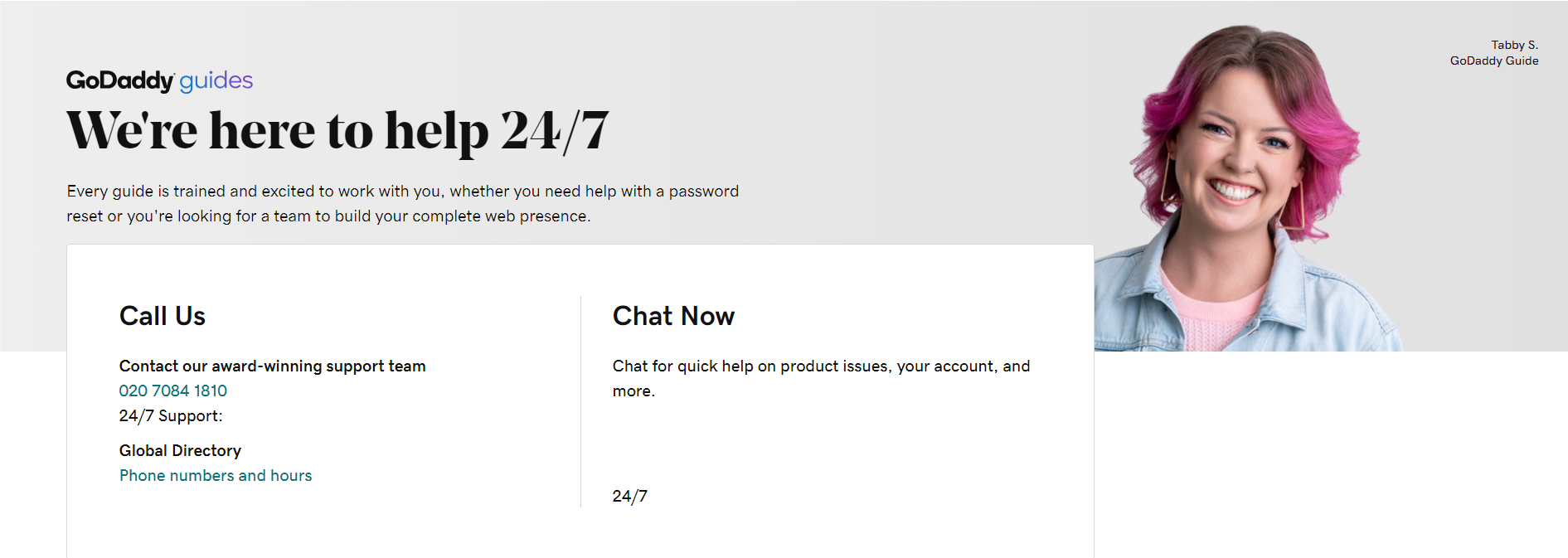
GoDaddy and IONOS provide a variety of customer support options, ensuring 24/7 availability through phone and email. GoDaddy offers additional support such as SMS support and a comprehensive knowledgebase that includes blog articles and guides. The live chat option, however, is limited to the U.S. subdomain. GoDaddy also offers automatic daily backups, global data centers, and security measures like DDoS protection, making it a reliable choice.
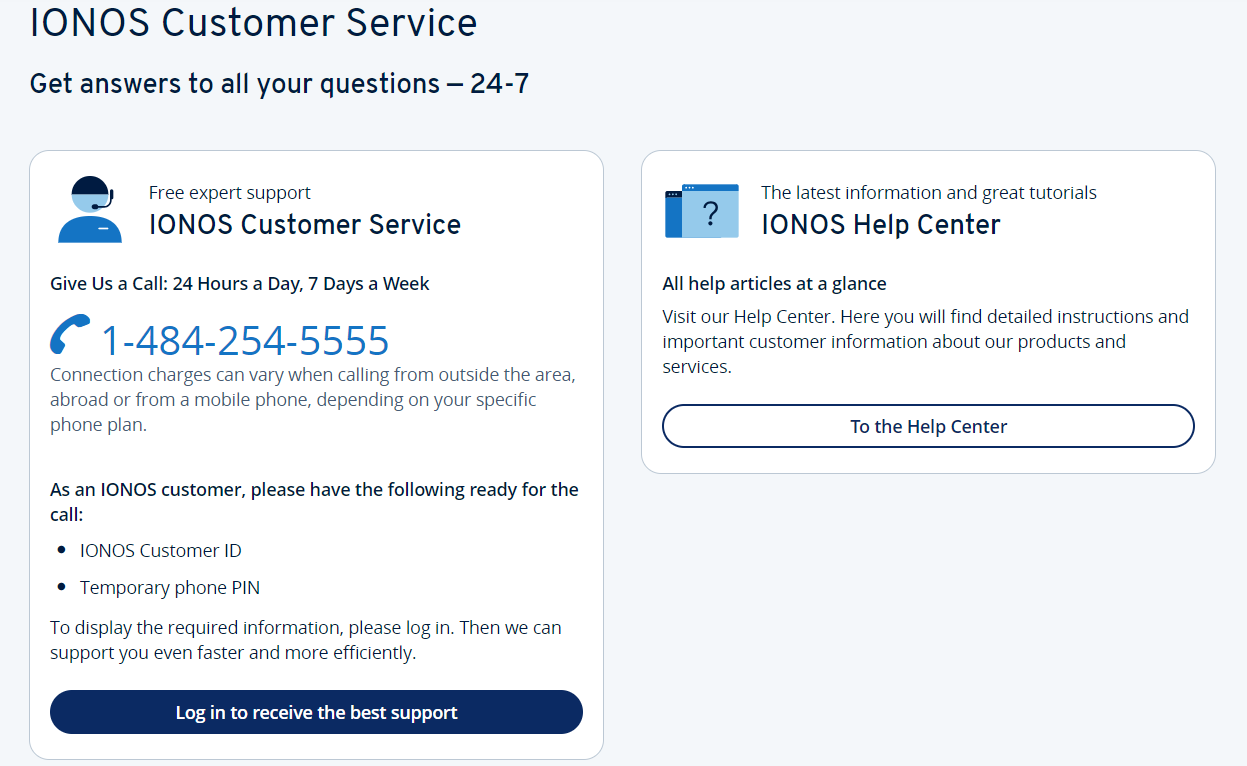
IONOS, on the other hand, stands out with its direct line to a personal consultant, providing tailored support during standard business hours. It also offers help through a community forum and a help center. IONOS’s chat support is available globally, making it more accessible to international users. Both providers offer a 30-day money-back guarantee and have been recognized for their quality tech support, with IONOS achieving a slightly higher score overall.
User feedback
GoDaddy generally receives praise for its ease of use, affordability, comprehensive service offerings, and user-friendly interface, making it a popular choice for domain registration and basic web hosting. Many users appreciate the ability to purchase domains, web hosting, email services, and other digital products all in one place, along with frequent discounts for new customers. However, customer service experiences are inconsistent; while some users find it helpful and responsive, others report long wait times and unknowledgeable support staff. Additionally, recurring issues include high renewal costs, persistent upselling, and occasional technical difficulties.
The user feedback on the hosting provider is highly mixed. Some customers appreciate the affordability and ease of use, particularly for startups, and praise the good customer support and convenient packages. However, many others criticize the company’s unreliable service, outdated user interface, and poor handling of issues, including severe downtime and inadequate customer support. There are also concerns about deceptive business practices and difficulty with account management, leading to significant dissatisfaction among long-term users.
FAQ
Which platform is better suited for hosting WordPress websites?
Both GoDaddy and IONOS offer managed WordPress hosting with strong security features and ease of setup. GoDaddy provides optimized servers and a global data center network for fast response times, while IONOS offers dual-platform technology and HTTP/2 for improved speed. Overall, both platforms are effectively tied in this category, making either a suitable option for WordPress hosting.
Are both platforms suitable for beginners?
Yes, both GoDaddy and IONOS are suitable for beginners. GoDaddy’s use of cPanel provides a familiar and user-friendly interface, making navigation easy even for those with limited technical skills. IONOS, while it does not use cPanel, offers a custom setup process and personalized support, which can be equally helpful for new users.
Which hosting service offers better security features?
IONOS offers superior security features including advanced DDoS protection, automatic malware removal, and customizable firewall rules. It also employs georedundant data centers for enhanced reliability. GoDaddy provides comprehensive SSL certificates and malware scanning but falls slightly behind due to the absence of certain advanced features available in IONOS.
Which platform offers better customer support?
IONOS offers slightly superior customer support, including access to a personal consultant for tailored advice and comprehensive support during standard business hours. GoDaddy provides 24/7 support via phone, chat, and email but has received mixed reviews regarding the consistency and quality of its customer service.
Which hosting service offers more scalability options for growing websites?
IONOS provides more flexibility with its elastic scaling features, allowing users to adjust performance levels without a full plan upgrade. This scalability is complemented by email notifications for resource limits. GoDaddy offers various plans that require manual upgrades for more resources, making IONOS a better option for growing websites.
The making of this blog
We followed a clear, step-by-step process to write and research this article.









